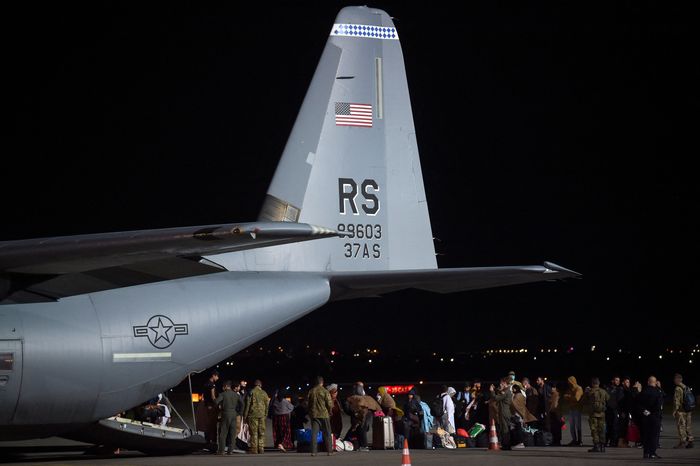WASHINGTON—Afghan evacuees housed on a U.S. military base in Kosovo are at risk of being denied entry to the U.S. because of their alleged links to the Taliban and other terrorist groups, U.S. officials have said, potentially leaving them without a home country.
Fewer than 10 Afghans have been declared ineligible for entry after security officials found disqualifying information about them during an extensive vetting process, according to a person familiar with the issue. About 90 other individuals continue to be vetted at the Camp Bondsteel base in Kosovo, according to administration officials.
Few countries have agreed to take any individuals barred from the U.S., and sending them back to Afghanistan, where they could be harmed, could violate international law. That presents a legal, humanitarian and diplomatic conundrum for the Biden administration after a chaotic evacuation effort last summer. Thousands escaped Kabul airport with little, if any, vetting, while more than 60,000 former interpreters and other visa applicants were left behind.
Most of the more than 100,000 Afghans who scrambled aboard evacuation flights in August after the U.S. withdrew its troops and the Taliban took over made their first stops at U.S. military bases overseas for initial security screenings. About 200 of them, some of whom are family members of the individuals who are undergoing extra vetting, were brought to Bondsteel for further vetting after questions were raised about their backgrounds.

Afghan refugees in August exited a U.S. Air Force plane upon their arrival at Pristina International airport in Kosovo.
Photo: afp contributor#afp/Agence France-Presse/Getty Images
Afghans held at the Kosovo camp described difficult conditions in which families with infants and small children have spent months in shared tents, with scant information about the reasons for their stalled journeys, according to Simina Quorishi, who runs a nonprofit that helps Afghan women. Ms. Quorishi’s sister has been held at the camp for months with her husband, a U.S. military contractor, and three small children.
Some of them once held high-profile positions in the Afghan government working alongside America’s top military leaders and diplomats, and include among them a former intelligence-agency chief, a three-star Afghan general and a former National Security Council spokesman.
American intelligence, counterintelligence and defense personnel are conducting extended vetting of the individuals in Bondsteel to determine whether any more of them can be cleared to continue their journeys to the U.S., as some have already done.
Julie Sirrs, a lawyer who is helping the former Afghan intelligence-agency chief held in Kosovo with his family, said the administration needed to allocate more resources to speed up the processing of cases. Ms. Sirrs met the intelligence-agency chief while working on intelligence issues in Afghanistan and doesn’t know why he is being held.
“He was one of our strongest allies,” she said. “He helped us tremendously during that first period when we entered Afghanistan.”
The individuals now at Bondsteel are technically free to leave or pull out of the application process to enter the U.S., but there must be another country that agrees to take them in, U.S. officials said. At least one such individual has done so successfully.
The U.S. is attempting to balance the security of the American homeland with the well-being of individuals it helped to evacuate from Kabul, said Seth Jones, a senior fellow at the Center for Strategic and International Studies in Washington. The U.S. should work to settle some individuals in other countries through diplomatic means but others may pose genuine security risks, he said.
SHARE YOUR THOUGHTS
How should the U.S. handle Afghan refugees who are being held at its base in Kosovo? Join the conversation below.
U.S. officials declined to say what information they have on the individuals who have been barred from the U.S. But it could include biometric data, such as fingerprints, that are traced to attacks on American or coalition troops during the 20-year conflict, or other troubling biographical data that connects an individual to a terrorist group, Mr. Jones said.
Officials said there are no prominent terrorists at Bondsteel, but declined to provide more information about who is being housed there.
“The very fact that the analysts and experts have wanted to continue working and understanding their cases suggests to me that these cases are complicated and they have merited further scrutiny,” said the senior administration official.
Among them is a former Taliban commander who was jailed at the American-run prison at Bagram for two years. The commander, who asked not to be named for security reasons, later switched sides to become a spokesman for the Afghan National Security Council in 2020. This has made him a top target of the Taliban, he said.
“All the people know who I am,” he said. “The Taliban will kill me and then deny any knowledge of the killing.”
Write to Gordon Lubold at [email protected] and Jessica Donati at [email protected]
Copyright ©2022 Dow Jones & Company, Inc. All Rights Reserved. 87990cbe856818d5eddac44c7b1cdeb8








